Simplicity rules action movies. Never mind the armies of stunt men and effects specialists making us believe a muscle-bound lead hits with the power of an 18-wheeler, or the controlled explosions that look real but are mostly digitally rendered. Those bells and whistles will always be elaborate. But they're the fancy dress on what boils down to a very basic premise. For example, some entity assumes it can act with impunity and gets away with plenty of crimes . . . until it crosses a sleeping giant. That man, and it is usually a man, mounts a rampage to beat the devil, standing on behalf of not just himself but smallfolk everywhere.
"Reacher" hooks into the widespread anti-establishment anxiety gripping both liberals and conservatives.
"Reacher" follows that formula to the word, distinctly spelling out the terms for viewers when, in the third episode of its recently concluded second season, the story flashes back to the last moments of a homicide victim's life. His body is shattered. He's facing a horrible end, and laughs in his killer's face, prompting the villain (Robert Patrick) to ask what's so funny. "I'm just thinking about what the Big Guy's going to do to you," he says. That thought doesn't save the condemned, but it leads his murderer to ask, "Big Guy? Who the hell was he talking about?"
For all the grimness of this scene, that reaction plays like a hilarious punchline. We've already seen what the Big Guy, better known as Jack Reacher (Alan Ritchson), can do. In a prior episode, Reacher busts a man's nose by triggering the air bag of the car he's sitting in. He achieves this by kicking its front end so hard that the vehicle reacts as if it's been in a crash.
Ritchson's muscles-upon-muscles physique sells this moment because he looks and behaves like the man Lee Child describes in his books. Reacher stands 6 feet, 5 inches tall and weighs around 250 pounds. His adversaries don't so much fight him as crash into his mass. He grew up in the military, followed orders to the letter until he was discharged. He respects women, not merely out courtesy or chivalry but because their brains and combat skills have saved him more than once.
He believes in people above all — not institutions, not systems. He never loses his sense of what's right, which is why whenever trouble crosses his path, he does something loud, messy and definitive.
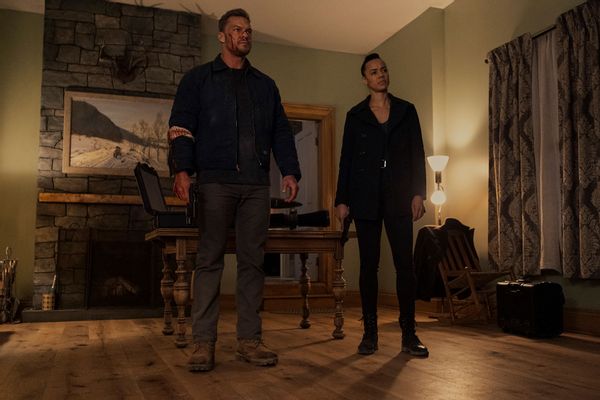 Reacher (Prime Video)Reacher's also unfailingly loyal to those who earn it, including the murdered man — a member of his old Army unit of special investigators, the 110th. Upon learning he was killed, Reacher joins his solid friend and former master sergeant Frances Neagley (Maria Sten) in New York to figure out that their unit is being targeted, placing them on a hit list with a ticking clock. But it's the way his friend was eliminated that seals his torturer's death sentence.
Reacher (Prime Video)Reacher's also unfailingly loyal to those who earn it, including the murdered man — a member of his old Army unit of special investigators, the 110th. Upon learning he was killed, Reacher joins his solid friend and former master sergeant Frances Neagley (Maria Sten) in New York to figure out that their unit is being targeted, placing them on a hit list with a ticking clock. But it's the way his friend was eliminated that seals his torturer's death sentence.
“I have the means to give you anything you can ask for,” Patrick's crook offers once Reacher gets his attention. "What is it that you want?"
Reacher calmly responds, “I want to throw you out of a helicopter.”
See? Simple.
Cultured Agatha Christie-style sleuths may dominate entertainment at present, but “Reacher” hooks into the widespread anti-establishment anxiety gripping both liberals and conservatives. Nobody feels our system of laws, checks and balances is working, least of all for them. The legal system traps the indigent and allows wealthy wrongdoers to buy their way out of accountability.
Reacher, Neagley and their surviving brethren of the 110th, which expands to include David O’Donnell (Shaun Sipos) and Karla Dixon (Serinda Swan), also operate under that assumption. None hold any illusions that the police or other government enforcement agents can protect them more effectively or efficiently than they can or dispense a punishment harsh enough to balance the scales of justice. Across the eight-episode second season, that has meant outright executing those who murdered their friends and anyone who abetted them.
Sure, the wheels and cogs of the legal system might work as intended. A sharpshooter's bullet is a lot more certain.
Of course, this is very dangerous thinking, regardless of how straight Jack Reacher’s aim may be in the moral universe's shooting gallery. But it is also cathartic. The Season 2 finale of "Reacher" is out now, and while I won't spoil what happens to the Big Bad, there's no question that he earned it. Reacher is, if nothing else, a man of his word.
People of every political stripe love action flicks, although I'm guessing progressive fans are more likely to receive lectures about the genre’s celebration of nationalism, militarism and right-wing fears of rampant criminality. “Reacher” lives up to all those accusations — the season opens with him interrupting a carjacking in what is either a suburb or a small town. Later, when he’s short on cash and weapons, he tosses a couple of drug dealers and takes their money and guns. None of those small-time targets are white.
That said, the folks at the top ranks of the criminal conspiracy he and the rest of his crew uncovers are, fulfilling most assumptions about who is running and ruining things regardless of one’s politics. This season's main evildoers are dirty ex-cops helped by a bent congressman. Sounds about right.
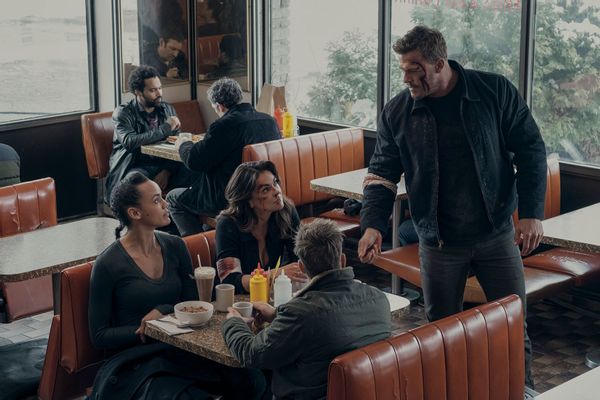 Reacher (Prime Video)Every crime solver has their weakness. Reacher’s is his lonely life. The show may be a bone-breaking punching tour of personal revenge that coincides with a rogue mission to keep the country safe, the type of red state red meat that sells. But he’s also an avatar of male isolation, paying for his avowed disconnection from the world by realizing how much of his friends' lives he’s missed. He doesn't compensate for that sorrow by taking a "cry harder, libs" stance toward people he disagrees with, mainly because he meets all types as he travels the country. By bus.
Reacher (Prime Video)Every crime solver has their weakness. Reacher’s is his lonely life. The show may be a bone-breaking punching tour of personal revenge that coincides with a rogue mission to keep the country safe, the type of red state red meat that sells. But he’s also an avatar of male isolation, paying for his avowed disconnection from the world by realizing how much of his friends' lives he’s missed. He doesn't compensate for that sorrow by taking a "cry harder, libs" stance toward people he disagrees with, mainly because he meets all types as he travels the country. By bus.
Reacher blends the type of ‘80s and ‘90s action meathead flicks that Gen X and elder Millennials were raised on with a combination of high I.Q. and emotional intelligence. This is why 80.8 percent of the show’s audience falls into these age demographics, according to Parrot Analytics, which also shows that the audience skews more male than its Prime Video cohorts “Jack Ryan” and “Bosch.”
We need your help to stay independent
Then again, plenty of women love action movies, and “Reacher” delivers one of those per week, employing stunning fight choreography headlined by Ritchson’s gigantic presence. In a genre that remains overwhelmingly sexist, series creator Nick Santora gives us a figure who knows strong women can handle their business. Dixon and Neagley match Reacher’s ferocity and smarts, and he never makes light of their skills. “Do I ever tell you how smart you are, Neagley?” Reacher frequently stops to ask, to which she replies, “Not nearly enough.” It’s a corny refrain, but you grow to appreciate it.
These may be dangerous people but, you know, they have their reasons.
“Reacher,” along with “Echo” and “The Brothers Sun,” invites us to empathize with people who murder because they feel they have no other choice. It feels dirty, but also delicious – after all, the guys who buy it really, really have it coming.
The leads in “The Brothers Sun” and “Echo” are assassins, though – not ex-military figures defending the little guy or upholding the righteousness that the justice system seems to have abandoned. They work for sinister crime lords. But we come around to rooting for Justin Chien’s Charles Sun when he realizes he’d rather bake and watch episodes of “General Hospital” than beat rivals to death with golf clubs and chair legs. He does terrible things, but we soon come to understand that he may not be a terrible man.
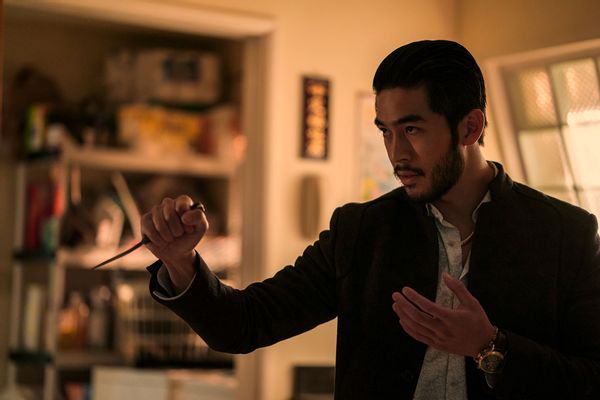 Justin Chien in "The Brothers Sun" (Netflix)The same is true of Alaqua Cox’s Maya Lopez in “Echo,” who turns on the man who corrupted her, beating dozens of his goons silly along the way. She can’t find peace until she reconciles her trauma and moves beyond it. Since “Echo” is a Marvel title, that means Maya taps into supernatural gifts from her family’s bloodline. “The Brothers Sun” lets Charles heal in part by becoming comfortable with his “softer” hobbies, like perfecting a churro recipe.
Justin Chien in "The Brothers Sun" (Netflix)The same is true of Alaqua Cox’s Maya Lopez in “Echo,” who turns on the man who corrupted her, beating dozens of his goons silly along the way. She can’t find peace until she reconciles her trauma and moves beyond it. Since “Echo” is a Marvel title, that means Maya taps into supernatural gifts from her family’s bloodline. “The Brothers Sun” lets Charles heal in part by becoming comfortable with his “softer” hobbies, like perfecting a churro recipe.
Neagley is the closest thing Reacher has to family, his most valued attachment despite his pride in having none. Baked into Child's profile of the character is Reacher's insistence on carrying nothing with him except for the clothes on his back and a toothbrush. He’s a vagrant by definition — a man with no job, no paper trail or online presence.
That much he has in common with the “First Blood” version of Sylvester Stallone’s John Rambo circa 1982; he's also infuriated by cruelty to dogs like "John Wick." We recognize these fictional figures as death dealers whose extralegal sentences are justified. Before Hollywood rebranded him as a "pure combat machine," Stallone's Rambo was a PTSD-stricken Vietnam veteran who could have lived out his days hiking the mild forests of the Pacific Northwest, living like an "Alone" contender. Some small-town sheriff decided to harass and abuse Rambo, unchaining his inner rage monster to kill-kill-kill for five movies.
What would Keanu Reeves’ hero be if a bunch of gangsters hadn’t killed the puppy gifted to him by his recently deceased wife? Just some widower with a nice house in a gated community. But someone had to FAFO, and here we are.
Want a daily wrap-up of all the news and commentary Salon has to offer? Subscribe to our morning newsletter, Crash Course.
People connect to these heroes, and “Reacher,” for reasons similar to the those in “Echo” and "The Brothers Sun.” These may be dangerous people but all of them would prefer to be left in peace. All of them come to realize that they need other people, someone to have their back in any scenario. Eventually that's why none of them stand by and let bullies, whether it's other criminals or indecent men wearing badges, steal their dignity or kill dogs or rob decent people of their calm or their loved ones. Someone has to balance the scales. Why not them?
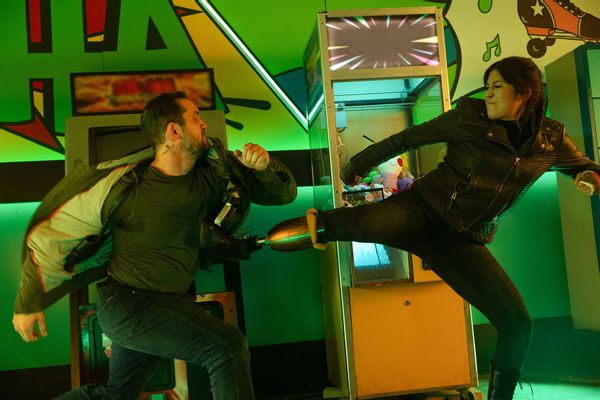 Echo (Disney/Marvel)And it's satisfying to fantasize about making people who scam the vulnerable or inflict grievous harm on the innocent answer for what they've done. Scores of such faceless criminals lurk out there in the dark, testing our locks every day by hoping we'll pick up the phone for that number we don't recognize, or click on that strange email claiming our accounts have been locked, or hacked, or that we've done something wrong.
Echo (Disney/Marvel)And it's satisfying to fantasize about making people who scam the vulnerable or inflict grievous harm on the innocent answer for what they've done. Scores of such faceless criminals lurk out there in the dark, testing our locks every day by hoping we'll pick up the phone for that number we don't recognize, or click on that strange email claiming our accounts have been locked, or hacked, or that we've done something wrong.
Reacher takes care of the worst of those worst while exercising a frightening degree of honesty. Like when he reassures a frightened mother and daughter in his protection by saying, “It won’t be forever. We just need to kill a few more people.”
Life holds no such correctives for most of us. Reasonable people wouldn't want it to. But for a few pulse-pounding episodes this show is an offramp for our agitation and anxiety. Reveling in his brutality may rumble our guts on some level. But seeing Reacher and Neagley repay offenses that tend to go unpunished in the real world also feels undeniably good.
All episodes of "Reacher" are currently streaming on Prime Video. "Echo" is streaming on Disney+ and Hulu, while "The Brothers Sun" is streaming on Netflix.


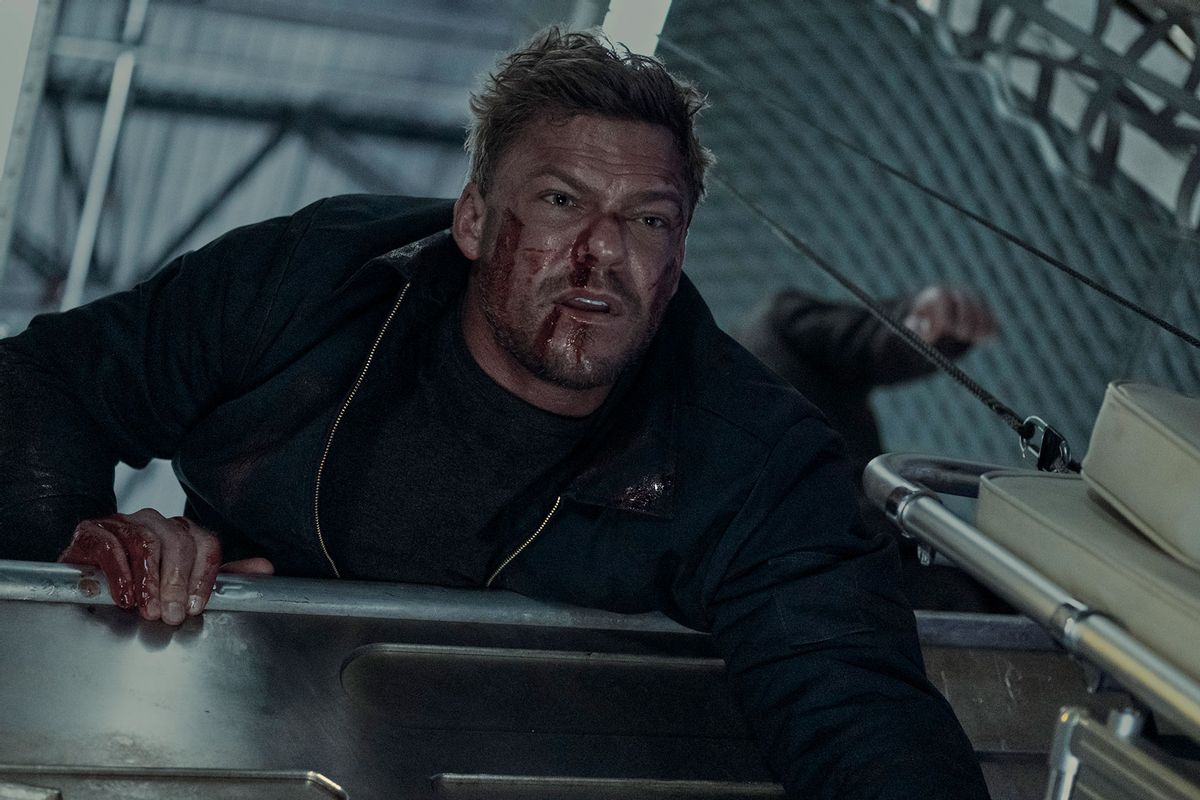
Shares